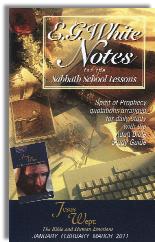|
||||||||||||||
Commentary on "Hope Against Depression"
Day 4: Tuesday, February 8, 2011 - Relief From Depression
Overview
In Tuesday's lesson, the author begins to address ways a person can relieve depression. His focus for this lesson is to discuss how talking out one's struggles with either a trusted friend or therapist may be helpful in coping with depression. He states that there is a healing effect in being able to verbalize one's feelings. He continues by stating that while a church community may be able to offer some help, in many cases it is insufficient, and professional care may be more warranted.
He goes on to say that regardless of the availability of a therapist or friend, we always have God we can talk with. Part of the reading for today's lesson is Psalm 55:17, "Evening, morning and noon I cry out in distress, and he hears my voice." He concludes by saying that everyone, regardless of whether they are suffering from clinical depression or not, can feel the help and benefit of prayer in times of discouragement. He writes, "...having a relationship with God can go a long way in bringing us hope and encouragement and healing."
Thoughts
The advice he gave about sharing your struggles with one another, as well as praying to God about them, is Biblical, and is, of course, a positive step towards healing.
While overall, I did not see any problems with what the author wrote, due to vagueness, it is important to focus on his final sentence: "No matter who we are or how deep our discouragement, having a relationship with God can go a long way in bringing us hope and encouragement and healing."
What does it mean to have a relationship with God, and how does that look?
First, in order to have a relationship with God, we must enter into a covenant relationship with Him. God desires for us to believe and trust Him. If we don't believe in who He is, and who He claims to be, and do not trust what He has accomplished for us, we will never understand what it means to be in a "relationship with God". To enter into a covenant relationship with Him means: 1) you must acknowledge that you are a sinner and cannot save yourself, 2) acknowledge that Christ is the Son of God and only He can save you, 3) believe His crucifixion was for your personal sins, and His death was in your behalf, and finally, 4) give Him your life and ask Him to be your Savior and Lord.
Once we have entered into a covenant relationship with Him, we can begin to see what living in a relationship with God looks like. Isaiah 43:7 says that everyone has been created for God's glory, "...everyone who is called by my name, whom I created for my glory, whom I formed and made." To be created for God's glory means that God wants to make Himself recognizable not only TO us, but also THROUGH us.
Colossians 1:27 says, "To them God has chosen to make known among the Gentiles the glorious riches of this mystery, which is Christ in you, the hope of glory." In this passage, Paul speaks of a "mystery", which is that Christ Himself dwells in the life of every believer. Romans 8:9 says that "if anyone does not have the Spirit of Christ, he does not belong to Christ." In other words, the moment each of us received Christ as our Savior (entered that covenant relationship with Him), the Holy Spirit took up residence in our inner being. Without the Spirit of God indwelling us, we have no hope whatsoever of God being recognizable in or through us.
Having a relationship with God also means that we are able to find satisfaction in God. As we grow in our walk with Him, we will begin to see that He can meet all of our needs. And the more satisfied we are by God's love, His Word, and His presence, the more we'll come to yearn for it. On the other hand, if we don't "feed" the dry areas of our lives with God's Word, love, and presence, we will end up discouraged and empty, because every believer needs to have God satisfy their lives.
Finally, to have a relationship with God means that we can experience God's peace. According to Galatians 5:22, true peace can only come from having a covenant relationship with God because it is a fruit of the Spirit living in us. Therefore, if we have received Christ into our lives, we have already been given peace. If we have already been given peace, then how is it that we can experience it during difficult circumstances when our situations and feelings defy peace?
Isaiah 9:6-7 says, "And he will be called...Prince of Peace. Of the increase of his government and peace there will be no end..." The key to experiencing peace is to recognize authority, and to completely surrender to the sovereign authority of Christ. Bowing ourselves to this authority may not always be easy, because we may not "feel" like letting go of the situation to God. But it is an act of obedience, which means we must choose to submit to His authority out of belief and faith rather than emotion.
In light of what was discussed above, there is truth in the author's comment, "No matter who we are or how deep our discouragement, having a relationship with God can go a long way in bring us hope and encouragement and healing." But without actually being in a covenant relationship with God, we will not know what "being in a relationship with God" means.
Summary
- In order to have a relationship with God, we must enter into a covenant relationship with Him.
- When we are in a relationship with God, we are able to glorify God, and therefore His glory will be manifest to us and through us.
- When we are in a relationship with God, we are able to be fully satisfied by God.
- When we are in a relationship with God, we are able to experience God's peace.
Copyright 2011 BibleStudiesForAdventists.com. All rights reserved. Revised January 18, 2011. This website is published by Life Assurance Ministries, Glendale, Arizona, USA, the publisher of Proclamation! Magazine. Contact email: BibleStudiesForAdventists@gmail.com.
The Sabbath School Bible Study Guide and the corresponding E.G. White Notes are published by Pacific Press Publishing Association, which is owned and operated by the Seventh-day Adventist church. The current quarter's editions are pictured above.
Official Adventist Resources
Standard Edition Study Guide Week 7
Teacher's Edition Study Guide Week 7


